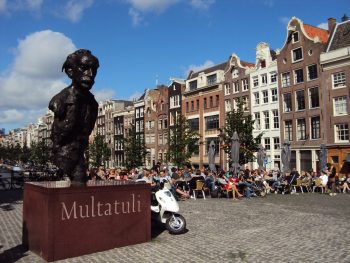200 Years of Multatuli Posted by Karoly Molina on Mar 4, 2020 in Culture
March 2020 will mark 200 years of one of the most renowned Dutch writers in history: Multatuli. To celebrate this, King Willem-Alexander inaugurated the Multatuli-jaar this past February at the Nieuwe Kerk in Amsterdam. In this post, I will explain a little of Multatuli’s life and his masterpiece Max Havelaar.
Wie was Multatuli?
Multatuli was the pen name of Eduard Douwes Dekker. He was born in Amsterdam on March 2, 1820, had four siblings, and was the son of a sea captain. In 1838, Douwes Dekker left for Jakarta (then known as Batavia) where he was an ambtenaar or a public servant with different administrative roles.
In one of these roles, he received heavy criticism from the governor due to problems with the budgets and excessive spending. Although this was done by his predecessors, Douwes had to pay back the money and was later removed from his post. He held several other positions in several areas including present-day Indonesia and China. When he was offered another position in 1857, Douwes resigned his appointment due to his disapproval of the Dutch colonial system and returned to the Netherlands.
Max Havelaar
Once in Amsterdam, Douwes began publishing short articles in different newspapers denouncing the scandals he had seen during his posts. At first, he didn’t receive much attention, however, with the publication of Max Havelaar, of De Koffij-veilingen der Nederlandsche Handel-Maatschappij in 1860, things quickly changed. Douwes published Max Havelaar with the pen-name Multatuli, a play on the Latin phrase meaning one who suffers much.
Max Havelaar told those living in the Netherlands and in the rest of Europe the reality of their comfort and wealth. At the time, the Dutch were making so much money trading coffee and sugar that was grown in present-day Indonesia. In exchange, the Dutch ruled with a heavy fist with high taxes and by requiring farmers to grow commercial crops rather than food staples. The government also sold the people opium continuing a long line of addiction and causing even more poverty.
Max Havelaar triggered several changes in the Netherlands and among other European countries. This included the introduction of an ethical policy that sought repay those living in the Dutch East Indies (present-day Indonesia). Max Havelaar also triggered the nationalist movement that led to the end of Dutch colonialism in Indonesia in 1949. In short, Multatuli’s novel was called “the book that ended colonialism.”
Once the book was published, it was quickly translated into several languages and a movie was made in 1976. Interestingly enough, it was translated into Indonesian until 1972 and the movie was shown in Indonesia in 1986. You can see the trailer below, and the entire film is available in YouTube.
200 jaar van Multatuli
This past February, the king inaugurated the year of Multatuli to commemorate 200 years of his birth. There will be several activities throughout the year organised by the Multatuli Genootschap or the Multatuli Society. The inauguration by King Willem-Alexander already started the conversation with a great article in the Volkskrant by the Dutch writer Arnon Grunberg. The video below is of a TV show where Grunberg was interviewed together with Dutch actor Thom Hoffman.
Have you heard of Multatuli and Max Havelaar? What other novels do you think have had the same impact as Max Havelaar?

Build vocabulary, practice pronunciation, and more with Transparent Language Online. Available anytime, anywhere, on any device.




